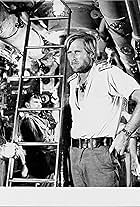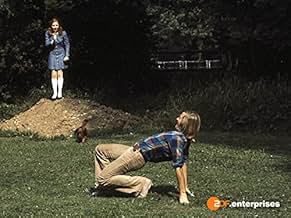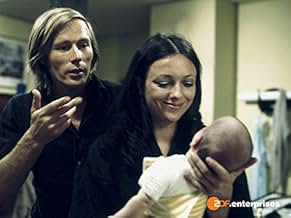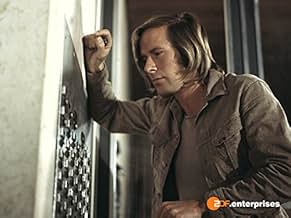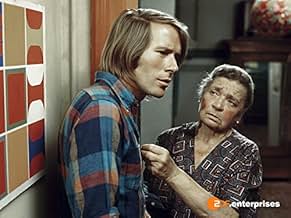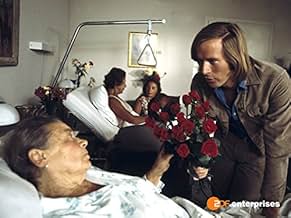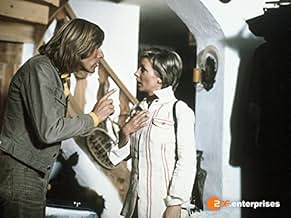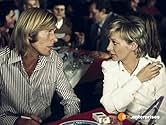Horst Janson
- Actor
- Stunts
- Soundtrack
He grew up in Mainz, Bad Soden and Wiesbaden. He found his passion for theater while still at school. He gained his first experience as an actor in student performances. At the age of 16, Janson took an aptitude test as an actor at the Frankfurter Bühnengenossenschaft. He then took acting lessons at the Wiesbaden School for Acting run by Hertha Genzmer. During this time he earned his living as a taxi driver. Following his acting training, he made his stage debut at the Hessisches Staatstheater Wiesbaden in Alfred de Musset's dance drama "Lorenzaccio".
He completed his training in the UFA junior studios. In 1959 he made his screen debut in the first part of Alfred Weidenmann's Thomas Mann film adaptation "The Buddenbrooks". As the captain's son Morten Schwarzkopf, he achieved his breakthrough as an actor alongside Liselotte Pulver as "Tony Buddenbrook". In the same year, 1959, he received the main role in the production "And still cheeky", in which he played the jazz musician "Fred". With his contribution in the Helmut Käutner film "The Glass of Water" in 1960, Horst Janson became a star of German post-war cinema alongside Gustav Gründgens and Liselotte Pulver.
This was followed by numerous leading and supporting roles in German and international productions such as "Das Riesenrad" (1961), "Call of the Wild Gänse" (1961), "Escape from East Berlin" (1962, Tunnel 28), "A Woman Looking for Love" ( 1968) and 1970 "The McKenzie Break" (Wolfpack). From the mid-1960s onwards, Janson often appeared in front of the TV camera. He was seen in crime films such as "The Mystery of Foresthouse" or the romance "The Lovers of Florence" from 1966. In 1969, Jansen celebrated as a series actor with the circus series "Salto mortale" and his role as the trapeze artist Sascha great successes. Alongside Heinz Rühmann, Janson appeared in front of the camera for "The Captain" in 1971. One of his most popular TV roles was that of the student in the television series "Der Bastian" from 1973.
Despite his age of 37, he owed the main role of the student Bastian of the same name to his significantly younger appearance. The start of the series was accompanied by protests because Horst Janson wore his hair too long for the social zeitgeist of the early 1970s. In 1973, the magazine "BRAVO" honored Horst Janson with the "Golden Otto," and a year later, in 1974, he was awarded the "Bambi" media prize. He also produced "Zinc Coffins for the Golden Boys" in 1973, "The Twins from Immenhof" and "Spring on Immenhof" in 1974, in which he played the estate tenant Alexander Arkens. In 1974, Janson replaced the veteran Van Helsing alias Peter Cushing as a professional vampire hunter in the British horror film "Captain Kronos - Vampire Hunter".
In the 1970s he also appeared in films such as "Shout at the Devil" and "Steiner - The Iron Cross, Part 2" with Richard Burton and Robert Mitchum. From 1980 to 1983, Horst Janson directed the children's program "Sesame Street", in which he was repeatedly seen as "Horst" together with Liselotte Pulver. He was also in the 1980s with numerous guest appearances in series such as "Our Most Beautiful Years", "Northern Lights", "Forest Inspector Buchholz", "Forsthaus Falkenau", "Two Rascals in Antalya", "The Country Doctor", "All My Daughters" and "Sylvia - A class of its own". In 1998 he played "Old Shatterhand" in Bad Segeberg based on the novels by Karl May and in 2001 he played "Old Firehand".
He was also featured in crime films such as "Sonderdezernat K l", "A Case for Two", "Smuggler" and "Coast Guard". In 2004 he was seen in the television film "The Wittelsbachers". The passionate sailor found his second star role in 2005 in the character of Bernd Jensen in the ARD TV series "Under White Sails". As an authentic captain, he travels the world's oceans. The production took him to Egypt, Greece and Cuba for over a month each. At the end of 2005, Janson made headlines due to an impending private bankruptcy that was triggered by the purchase of East German real estate in 1995 and was averted shortly afterwards.
Horst Janson lives with his family in Munich. His first marriage was to the actress Monika Lundi, and his second marriage to Hella (née Helgardt Ruthardt) resulted in his daughters Sarah-Jane (born 1984) and Laura-Maria (born 1986), who themselves had a career as Actresses competed.
He completed his training in the UFA junior studios. In 1959 he made his screen debut in the first part of Alfred Weidenmann's Thomas Mann film adaptation "The Buddenbrooks". As the captain's son Morten Schwarzkopf, he achieved his breakthrough as an actor alongside Liselotte Pulver as "Tony Buddenbrook". In the same year, 1959, he received the main role in the production "And still cheeky", in which he played the jazz musician "Fred". With his contribution in the Helmut Käutner film "The Glass of Water" in 1960, Horst Janson became a star of German post-war cinema alongside Gustav Gründgens and Liselotte Pulver.
This was followed by numerous leading and supporting roles in German and international productions such as "Das Riesenrad" (1961), "Call of the Wild Gänse" (1961), "Escape from East Berlin" (1962, Tunnel 28), "A Woman Looking for Love" ( 1968) and 1970 "The McKenzie Break" (Wolfpack). From the mid-1960s onwards, Janson often appeared in front of the TV camera. He was seen in crime films such as "The Mystery of Foresthouse" or the romance "The Lovers of Florence" from 1966. In 1969, Jansen celebrated as a series actor with the circus series "Salto mortale" and his role as the trapeze artist Sascha great successes. Alongside Heinz Rühmann, Janson appeared in front of the camera for "The Captain" in 1971. One of his most popular TV roles was that of the student in the television series "Der Bastian" from 1973.
Despite his age of 37, he owed the main role of the student Bastian of the same name to his significantly younger appearance. The start of the series was accompanied by protests because Horst Janson wore his hair too long for the social zeitgeist of the early 1970s. In 1973, the magazine "BRAVO" honored Horst Janson with the "Golden Otto," and a year later, in 1974, he was awarded the "Bambi" media prize. He also produced "Zinc Coffins for the Golden Boys" in 1973, "The Twins from Immenhof" and "Spring on Immenhof" in 1974, in which he played the estate tenant Alexander Arkens. In 1974, Janson replaced the veteran Van Helsing alias Peter Cushing as a professional vampire hunter in the British horror film "Captain Kronos - Vampire Hunter".
In the 1970s he also appeared in films such as "Shout at the Devil" and "Steiner - The Iron Cross, Part 2" with Richard Burton and Robert Mitchum. From 1980 to 1983, Horst Janson directed the children's program "Sesame Street", in which he was repeatedly seen as "Horst" together with Liselotte Pulver. He was also in the 1980s with numerous guest appearances in series such as "Our Most Beautiful Years", "Northern Lights", "Forest Inspector Buchholz", "Forsthaus Falkenau", "Two Rascals in Antalya", "The Country Doctor", "All My Daughters" and "Sylvia - A class of its own". In 1998 he played "Old Shatterhand" in Bad Segeberg based on the novels by Karl May and in 2001 he played "Old Firehand".
He was also featured in crime films such as "Sonderdezernat K l", "A Case for Two", "Smuggler" and "Coast Guard". In 2004 he was seen in the television film "The Wittelsbachers". The passionate sailor found his second star role in 2005 in the character of Bernd Jensen in the ARD TV series "Under White Sails". As an authentic captain, he travels the world's oceans. The production took him to Egypt, Greece and Cuba for over a month each. At the end of 2005, Janson made headlines due to an impending private bankruptcy that was triggered by the purchase of East German real estate in 1995 and was averted shortly afterwards.
Horst Janson lives with his family in Munich. His first marriage was to the actress Monika Lundi, and his second marriage to Hella (née Helgardt Ruthardt) resulted in his daughters Sarah-Jane (born 1984) and Laura-Maria (born 1986), who themselves had a career as Actresses competed.
